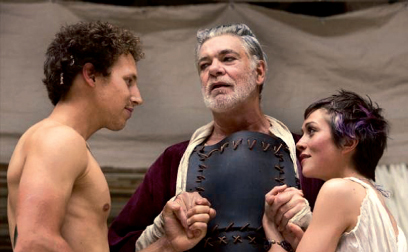|

Love in Troy
‘Troilus and Cressida’ is a lovely play that was staged at the
Shakespeare’s Globe Theatre recently.
At the theatre where Shakespeare originally wrote plays for, the
lesser known ‘Troilus and Cressida’ is an amazing love story with
everything from action to raw emotion.
 Matthew Dunster, the director of the play has directed the Globe’s
first full-scale production of ‘Troilus and Cressida’ featuring Olivier
Award-winner Matthew Kelly as Pandarus, with Laura Pyper and Paul
Stocker as the ill-fated lovers Troilus and Cressida. Other casting
includes Jamie Ballard as Ulysses and Paul Hunter as Thersites. Set
during the latter years of the Trojan War, Shakespeare fills his ancient
tale with savage comedy, great passion and vivid characters. Matthew Dunster, the director of the play has directed the Globe’s
first full-scale production of ‘Troilus and Cressida’ featuring Olivier
Award-winner Matthew Kelly as Pandarus, with Laura Pyper and Paul
Stocker as the ill-fated lovers Troilus and Cressida. Other casting
includes Jamie Ballard as Ulysses and Paul Hunter as Thersites. Set
during the latter years of the Trojan War, Shakespeare fills his ancient
tale with savage comedy, great passion and vivid characters.
‘Troilus and Cressida’ takes place during the latter years of the
Trojan War, faithfully following the plotline of Homer’s ‘Iliad’ in
which Achilles refuses to participate in battle to Hector’s death.
Essentially, two plots are followed in this play. In one, Troilus, a
Trojan prince (son of Priam), woos Cressida, another Trojan.
They profess their undying love for each other before Cressida is
exchanged for a Trojan prisoner of war. As he attempts to visit her in
the Greek camp, Troilus glimpses Diomedes flirting with his beloved
Cressida, and decides to avenge her perfidy. Even though this act offers
an eponym for ‘Troilus and Cressida’, it accounts for only a small part
of its run time.
The majority of the play revolves around the leaders of the Greek and
Trojan forces, Agamemnon and Priam. Agamemnon and his cohorts attempt to
get the proud Achilles to return to battle and face Hector, who sends
the Greeks a letter telling them of his willingness to engage in
one-on-one combat with a Greek soldier.
Ajax is originally chosen as this combatant, but makes peace with
Hector before they are able to fight.
Achilles is only prompted to return to battle after his friend and
(according to some of the Greeks) lover, Patroclus, is killed by Hector
before the Trojan walls. A series of skirmishes conclude the play,
during which Achilles catches Hector, and has the Myrmidons kill him.
The conquest of Troy is left unfinished, as the Trojans learn of the
death of their hero. |

